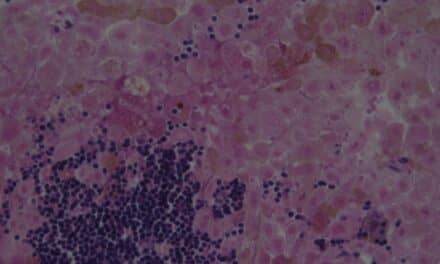Study results have demonstrated that a test based on a protein signature associated with patient outcomes in metastatic melanoma can effectively predict survival among patients receiving programmed cell death-1 (PD-1) antibodies. The test, developed using the proprietary Diagnostic Cortex machine learning platform from Biodesix, Boulder, Colo, is based on mass spectrometry analysis of patient serum.
“Understanding the biology of immune-resistant patients is critical to providing those patients with optimal therapy,” says Jeffrey Weber, MD, PhD, deputy director of the Laura and Isaac Perlmutter Cancer Center at NYU-Langone Health, and lead author of the study. “While further validation in large, randomized studies is needed, this study suggests that a blood-based test could provide a basis for identifying melanoma patients who may be either sensitive or resistant to checkpoint inhibition and allow an appropriate therapeutic choice to be made for individual patients.”
“Adapting gene set enrichment analysis to protein data allowed identification of biological processes associated with test classifications,” says Heinrich Roder, PhD, chief technical officer at Biodesix. “The information derived from protein set enrichment analysis could help develop treatments overcoming primary anti-PD-1 resistance by adding inhibition of complement activation, suppression of wound healing, or down-modulation of acute phase pathways by blocking IL6 and IL1. These data may indicate that similar resistance mechanisms might be at work in other tumor types and increase the likelihood that Biodesix can develop tests outside of melanoma.”
A recent study showed that a subset of around 30% of the previously treated, metastatic melanoma patients subsequently treated with the anti-PD-1 nivolumab experienced durable responses and clinical benefit.1 However, such immunotherapies as PD-L1 blockers are relatively costly and associated with significant toxicities in some patients. Delivering treatment only to those patients most likely to benefit would result in elimination of unnecessary toxicity and healthcare savings for patients who would not benefit from anti-PD-1 therapy, but might benefit from combination immunotherapy or other therapies.
For more information, visit Biodesix.
REFERENCE
- Hodi FS, Kluger H, Sznol M, et al. Durable, long-term survival in previously treated patients with advanced melanoma (MEL) who received nivolumab (NIVO) monotherapy in a phase I trial [abstract]. Presentation at the annual meeting of the American Association for Cancer Research, New Orleans, April 16–20, 2016. Cancer Res. 2016;76(14 Suppl):abstract CT001; doi: 10.1158/1538-7445.am2016-CT001.







